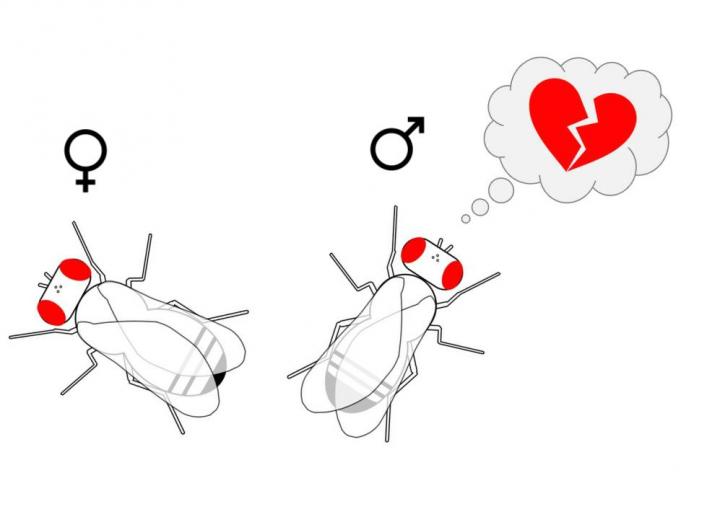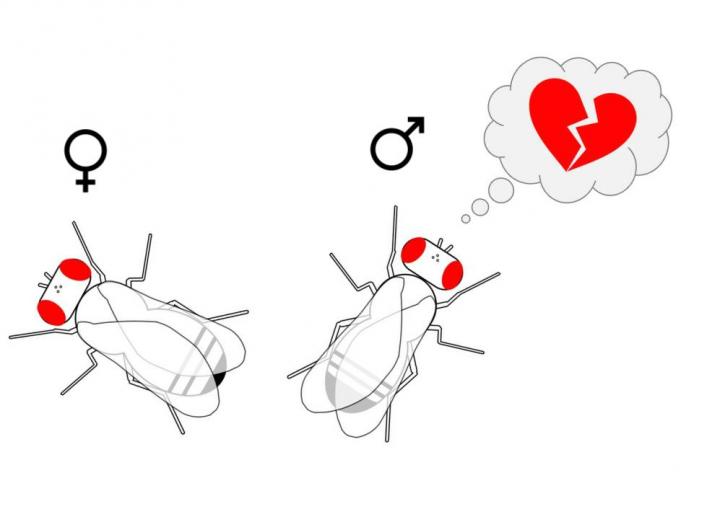
Credit: Adams lab, UC Riverside.
RIVERSIDE, Calif. – Unsuccessful courtship attempts by males create aversive memories that can reduce their level of enthusiasm for subsequent courtship attempts. Scientists at the University of California, Riverside and colleagues have attempted to understand this behavior at the molecular level.
In the fruit fly (Drosophila melanogaster), which the researchers used as a model organism, a courting male rejected by a mated female subsequently courts less avidly when paired with a virgin female. The researchers show that the body's hormonal state is critical to the maintenance of such "courtship memories."
They report today in Current Biology that two hormones are required in the brain to maintain courtship memories: ecdysis triggering hormone (ETH) and juvenile hormone (JH). Further, dopamine, a neurotransmitter that helps control the brain's reward and pleasure centers, also plays a crucial role. ETH is essential for courtship memory through regulation of JH levels in adult males, the researchers note.
"Memories of prior experiences have important influences on future behaviors," said Michael Adams, a professor of entomology and neuroscience, who led the research project. "Our study underscores the underappreciated role of hormonal state in the ability of animals to learn and remember experiences. This hormonal state is maintained by a signaling cascade – a multistep pathway that involves ETH, JH, and dopamine neurons. This ETH-JH-dopamine signaling cascade operates during a critical period early in adulthood, specifically, the first three days. Limited to early adulthood, it regulates memory during this critical period, and is required to promote social-context-dependent memory."
In their lab experiments, the researchers found that a male fruit fly spurned by a female fruit fly continues to approach the female if the signaling cascade is interrupted (via JH level reduction achieved by silencing ETH signaling genes), due to loss of the short-term memory of the unsuccessful courtship.
"In the absence of the hormonal signaling cascade, the animal doesn't maintain the memory of courtship failure," said Sang Soo Lee, a graduate student in the Adams lab and the first author of the research paper. "It rapidly forgets the unsuccessful courtship, and goes on to court at a level it would have in the absence of that courtship failure. In the lab, we are able to rescue this memory by applying methoprene, a chemical that mimics JH. Following methoprene treatment, the male flies rejected by mated females show normal levels of courtship suppression, indicating that JH plays a crucial role in maintenance of memory."
Hormones are organic substances that circulate in the blood stream and are needed for maintaining homeostasis. In insects, ETH stimulates a gland to secrete JH. JH, in turn, acts on dopamine neurons – nerve cells that synthesize and release dopamine – in the brain.
During early development, JH, one of the most well studied hormones in insects, maintains the juvenile state. It is present in all insects, male and female. It disappears, however, during metamorphosis only to return when the insect becomes an adult. At that time, JH acquires reproductive functions.
Adams explained that JH, discovered in the 1930s, is strictly an insect hormone and that JH signaling, conserved across a wide range of insect species, may have signaling functions similar to thyroid hormone in mammals.
"This work raises the question of what emotion is," he said. "We have male fruit flies experiencing failure in courtship, failure in mating, and their negatively modified behavior affects their subsequent enthusiasm for courtship encounters. This could be viewed as an emotional or stress response to failure."
Lee explained that in the field of learning and memory, most studies focus on neural circuitry, with only a few studies successfully showing that hormones can be good modulators of neural circuits.
"Why would it be adaptive for these hormones to promote maintenance of unpleasant memories?" he said. "Such memories may enhance the male's ability to mate successfully by shifting attention to receptive females, where successful mating is much more likely. In other words, there is no point in wasting valuable time pursuing unreceptive females.
"The hormonal cascade is a good upstream regulator of neural circuits," he added. "The cascade operates in females, but its function is different. It influences learning and memory, but also reproductive physiology – egg development and ovulation."
###
The research was funded by a grant to Adams from the National Institutes of Health. The Agricultural Experiment Station, the Office of Research and Economic Development, and the Graduate Division, all at UC Riverside, provided additional funding.
Adams, who is the director of the UCR Graduate Neuroscience Program, and Lee were joined in the study by Yike Ding and Natalie Karapetians at UCR; and Crisalejandra Rivera-Perez and Fernando Gabriel Noriega at Florida International University, Miami.
Next, the researchers will study what role ETH and JH play in long-term memory.
"Evidence is emerging that the same hormones operating through different signaling pathways are involved in long-term memory," Adams said.
The University of California, Riverside is a doctoral research university, a living laboratory for groundbreaking exploration of issues critical to Inland Southern California, the state and communities around the world. Reflecting California's diverse culture, UCR's enrollment is now nearly 23,000 students. The campus opened a medical school in 2013 and has reached the heart of the Coachella Valley by way of the UCR Palm Desert Center. The campus has an annual statewide economic impact of more than $1 billion.
Media Contact
Iqbal Pittalwala
[email protected]
951-827-6050
@UCRiverside
http://www.ucr.edu





